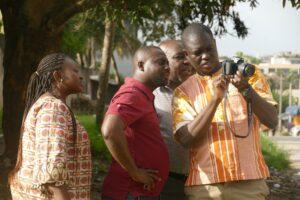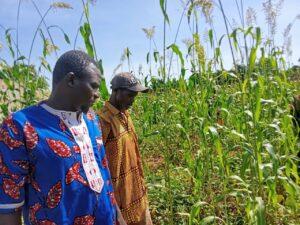From July 10 to 11, 2024, the start-up workshop for the project to combat the illegal donkey skin trade in Côte d’Ivoire was held at the Inades-Formation general secretariat in Abidjan.
The workshop brought together project teams from the Inades-Formation and Inades-Formation Côte d’Ivoire General Secretariats, a 5-member delegation from Brooke West Africa, an organization committed to animal welfare, in particular for horses, donkeys and mules, and the Côte d’Ivoire Ministry of Fisheries Resources.
The workshop kicked off with a word of welcome from Inades-Formation’s General Secretary, Sena Adessou, who extended the traditional welcome to participants, before setting the scene for the meeting.
Emmanuel Bouré Sarr, Director of Brooke West Africa, then thanked Inades-Formation for its warm welcome and set the scene for the workshop. Its five-member delegation is justified by the need, at this early stage of the project, for both partners to agree on the procedures, expectations and roles of each for the smooth running of the project. In his view, “it’s important to agree on the principles and rules for running the project”, which will be presented throughout the workshop.
He went on to explain the specific nature of this pilot project, funded by Brooke UK headquarters to enable the Brooke West Africa team to extend its actions to all West African areas not yet covered by the global project to preserve the asinine species, and to test new approaches.

The partnership with Inades-Formation, thanks to its presence in these countries, will enable us to achieve this objective.
Fighting for the survival of the asinine species
Over the course of the two days, presentations enabled participants to gain a better understanding of the issues involved in combating the illegal trade in the asinine species. A challenge linked to the preservation of this species, whose global population has fallen by 37% in 5 years.
Indeed, donkey skin is particularly prized in China due to the growing interest in gelatin (Ejiao), which is believed to have medicinal properties in traditional Chinese medicine. The world’s and Africa’s donkeys are thus sacrificed on the altar of Chinese “medicine”.
With the drastic fall in China’s donkey population, from 11 million in 1992 to 2.6 million in 2020, and the failure of an attempt at intensive breeding, China has turned to other countries, notably Africa, to source its donkey skins.
This trade has dramatic consequences on a number of levels, notably on the well-being of donkeys, on the environment and animal health (unsanitary conditions around the processing and slaughter of donkeys, stress, equine diseases, anthrax…), and on the survival of the asinine species.
In addition to its negative effects, the donkey skin trade poses ethical problems, as it is motivated by reasons that have nothing to do with human survival.

A plea to save the asinine species in West Africa
In Africa, donkeys make a significant contribution to agricultural production and food security. They are used on a daily basis for collecting water, transporting families to medical centers and children to schools, thus helping to reduce certain costs for the families who use them.
The aim of this project is therefore to contribute to the preservation of the donkey species in West Africa, to continue regional advocacy on the illegal trade in donkey skins, and to encourage countries that have not yet done so, such as Togo, to take action against this trade and to enforce the texts in their countries.
As part of this project, awareness-raising activities for donkey owners will focus on the northern areas of the country, where these animals are used. Advocacy activities will also be deployed towards local traditional, prefectoral, departmental, regional, national and international authorities. The project will also include Togo and Chad.
The experience of Inades-Formation’s national offices, already involved for several years in projects to preserve the asinine species with Brooke, will be capitalized on to implement the project in Côte d’Ivoire. These include Inades-Formation Burkina, Inades-Formation Kenya and Inades-Formation Tanzania.
It should be noted that Côte d’Ivoire has introduced regulations against the illegal trade in donkey skins.
The kick-off workshop was followed by a project team mission to northern Côte d’Ivoire.
General Secretariat – Communication
Find out more with interviews with the Director of Brooke West Africa and the General Secretary of INADES-Formation.











